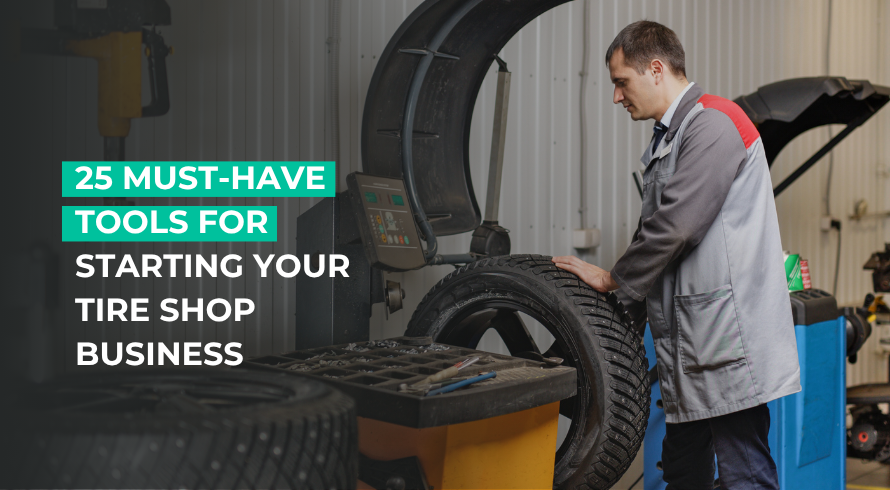Opening a tire shop? Your tools are the backbone of your business. With the right tire tools and equipment, you’ll save time, reduce mistakes, and give customers better service from day one.
Here’s a breakdown of the 25 must-have items, divided into essentials for getting started and tools that boost your shop’s efficiency. If you’re looking for a reliable tire shop equipment list, this guide has you covered.
Why choosing the right tire shop equipment matters
Investing in quality tools isn’t just about getting the job done. It’s about getting it done safely, quickly, and correctly. The right equipment for a tire shop:
- Speeds up service times
- Reduces injury risk for your team
- Helps tires last longer for your customers
- Boosts trust and satisfaction, bringing people back
Investing in quality tools isn’t just about getting the job done. It’s about getting it done safely, quickly, and correctly. The right equipment for a tire shop:
11 essential tools & equipment to get your tire shop up and running
These are the core tools and machines you’ll need to handle tire mounting, balancing, and basic repairs.
1. Tire changer machine
This machine removes and installs tires onto wheels. Choose between manual, semi-automatic, and automatic types depending on your budget and service volume. Make sure it can handle a range of tire sizes.
A quick check on the types of vehicles your tire shop will cater to can help you decide the type of tire changer you need to get. There are many different types of tire changers that you can consider getting. Here are a few top ones:
- Basic/manual tire changer: A basic tire changer is all you need if your shop works on standard passenger vehicles. The manual tire changer is great for low-volume shops. This equipment is much more affordable. But the manual requirements will add time to your repair orders.
- Semi-automatic tire changer: A semi-automatic tire changer combines manual and automated processes. They assist with bead breaking and tire demounting, but you’ll still need to install the tire back onto the rim. Overall, this option strikes a balance between affordability and efficiency.
- Automatic tire changer: Then you have your automatic tire changers, which are great for high-volume shops. These advanced machines handle bead breaking, demounting, and mounting with minimal manual effort. They are efficient and suitable for shops with moderate to high tire service demands.
- Heavy-duty tire changer: There are also heavy-duty tire changers for trucks, buses, and industrial vehicles. You need to invest in a heavy-duty tire changer if you want to attract customers running commercial businesses.
Apart from these, there are swing-arm tire changers, tilt-back tire changers, and touchless/leverless tire changers. Each changer has unique benefits. It all comes down to your tire shop’s specific needs.
When selecting a tire changer for your shop, consider factors such as the volume of tire service you provide, the types of vehicles you service, the available space, and your budget. Invest in a tire changer that aligns with your business needs and can help you provide efficient and reliable tire services to your customers.
2. Wheel balancer
This tool ensures smooth driving by evenly balancing each wheel. Dynamic balancers are more accurate, while static or bubble balancers are more affordable. There are three types of wheel balancers: static, dynamic, and bubble. Which of these would you need? Let’s see.
- Static wheel balancer: Static wheel balancers are the most basic type. They operate on the principle that the heaviest part of the tire and wheel assembly will gravitate to the bottom when suspended. They are generally more suitable for non-precision applications, such as lawn equipment and off-road vehicles.
- Dynamic wheel balancer: Dynamic wheel balancers are more sophisticated than static ones. They address static and dynamic imbalances by assessing the weight distribution around the entire wheel and tire assembly as it rotates. These balancers provide more accurate results and are suitable for passenger cars, trucks, and other vehicles where precision balancing is crucial for a smooth ride.
- Bubble balancer: Bubble balancers, also known as bubble-level balancers, are the most basic type of wheel balancer. You can use them for small-scale operations or temporary balancing needs. Bubble balancers consist of a horizontal axle and a bubble level. But they lack the precision and accuracy of dynamic balancers and are often considered less reliable for achieving optimal balance.
Dynamic wheel balancers are the most used in professional tire shops due to their accuracy and ability to address static and dynamic imbalances. You can decide which wheel balancer to get based on your tire shop’s requirements.
3. Air compressor
You’ll need strong air pressure for tire inflation and to power pneumatic tools. A two-stage compressor is ideal for continuous, high-volume work.
4. Vehicle lift
A good lift lets your team safely raise vehicles for tire service. Consider 2-post or 4-post lifts depending on shop space and vehicle size.
5. Alignment machine
Wheel alignment improves tire life and ride quality. A laser or digital alignment system helps you offer a high-margin upsell service.
6. Tire inflator with gauge
Accurate inflation tools are critical for safety and tire performance. Digital gauges with automatic shut-off features provide the best accuracy.
7. Tire repair kit
These are among the most commonly used tire repair tool names in any shop. A full kit includes patch tools, plugs, vulcanizing cement, and rasps to quickly fix punctures. Always keep extra supplies in stock.
Two of the must-haves include:
- Tire plug kit: These kits contain tools for inserting tire plugs into punctured tires. They often include reaming tools to clean the hole and insertion tools to place the plug securely.
- Patch kit: Patch kits repair larger punctures or cuts in the tire. You can place the patches on the inside of the tire to ensure the repair is dependable and lasts a long time. You can even add a tire patch roller to press and smooth out patches applied to the inside of the tire for a secure bond.
8. Valve stem tools
Essential for removing and installing valve stems. Look for durable metal tools that reduce slippage and wear.
9. Torque wrench
Prevents over- or under-tightening of lug nuts. Critical for safety and avoiding customer callbacks.
10. Tire spreaders
Used to inspect and repair the inner tire casing. Available in manual or powered models, depending on your workflow needs.
11. Floor jacks and jack stands
Useful for lifting one wheel at a time. Having multiple sets allows you to handle several vehicles at once.
14 additional tools & equipment to improve tire shop efficiency
With the basics covered, these tools and upgrades will help your shop run faster and more smoothly.
12. TPMS Tool
Tire Pressure Monitoring Systems need special tools for sensor resets and programming. Make sure your tool supports a wide range of vehicles.
13. Bead Seater
Blasts compressed air to seat the tire bead quickly, especially helpful for large or stubborn tires.
14. Nitrogen Inflation System
Some drivers prefer nitrogen over air for its pressure stability. A small tank system can be an appealing service add-on.
15. Wheel Weight Kit
For tire balancing. Include both clip-on and adhesive weights in a variety of sizes and materials.
16. Lug Nut Socket Set
These impact-rated sockets in common sizes are essential tools for any technician. Color-coded options protect wheels from scratches.
17. Tire Storage Racks
Proper storage keeps your workspace clean and safe. Choose vertical or wall-mounted racks to maximize space. Store and display your tire inventory keeping professionalism in mind for incoming customers. With shelves and racks, or whatever you decide to go with, make sure your entire shop has enough room for your tire inventory.
18. Service Cart
Reduces back-and-forth trips by keeping tools organized and mobile.
19. Workbenches and Vises
A sturdy bench is essential for patching, prepping valve stems, and minor tool repairs. A mounted vise improves safety and control.
20. Customer Waiting Area Setup
Clean seating, Wi-Fi, and refreshments help customers feel welcome. A good first impression builds repeat business.
21. Shop Management Software
Using software like AutoLeap’s tire shop software helps you keep track of inventory, appointments, customer information, and financial records. This is one of the initial investments you will need to make as you start your tire shop. It will help you organize your entire business and help you streamline day-to-day tasks.
22. Safety Gear and Supplies
Safety should be a top priority in your tire shop. Equip your workspace with safety gear such as goggles, gloves, fire extinguishers, and proper ventilation systems. These are essential for your work staff. Provide them with the right equipment and a safe environment to work.
Make sure your equipment for tire shop operations meets safety guidelines. Start by reviewing OSHA’s standards for automotive shops.
23. Marketing and Point-of-Sale Materials
Develop branding materials, signage, and marketing collateral to attract customers and promote your services. Marketing is a building block for any new business. And while this does not fall under equipment, marketing is a powerful tool to help you grow your tire shop. Use social media and email marketing to attract new customers and engage existing customers.
24. Training and Education Resources
Training, again, is an essential part of any business. When you invest in training for you and your staff, you ensure your tire shop provides expert services. You are also keeping up with the latest advancements in tire technology and maintenance.
25. Cleaning and Maintenance Supplies
Maintaining a clean and organized workspace showcases your shop’s professionalism. It’s also crucial for ensuring a safe and efficient operation. Clean and sanitize your surfaces, tools, and equipment in the service and waiting areas to create a welcoming environment for clients.
Additionally, having designated storage spaces for cleaning supplies, along with a routine cleaning schedule. This helps streamline operations and showcases your commitment to providing a top-notch tire shop experience.
» Looking to transform your shop? Discover how AutoLeap can help.
Final thoughts
Getting your tire shop off the ground starts with the right equipment needed to start a tire shop. From the essentials to the extras, this tire shop equipment list is your step-by-step guide to doing it right.
Frequently Asked Questions
What tools are used in a tire shop?
Tools such as tire changers, wheel balancers, alignment machines, air compressors, and repair kits see plenty of use in a tire shop.
How do I get more business at a tire shop?
To get more business at a tire shop, consider offering promotional deals, excellent customer service, and expanding your online and local marketing efforts.
What are the initial costs associated with starting a tire shop?
The initial costs associated with starting a tire shop include expenses for equipment, lease or purchase of a suitable location, licensing, permits, insurance, and initial inventory.








